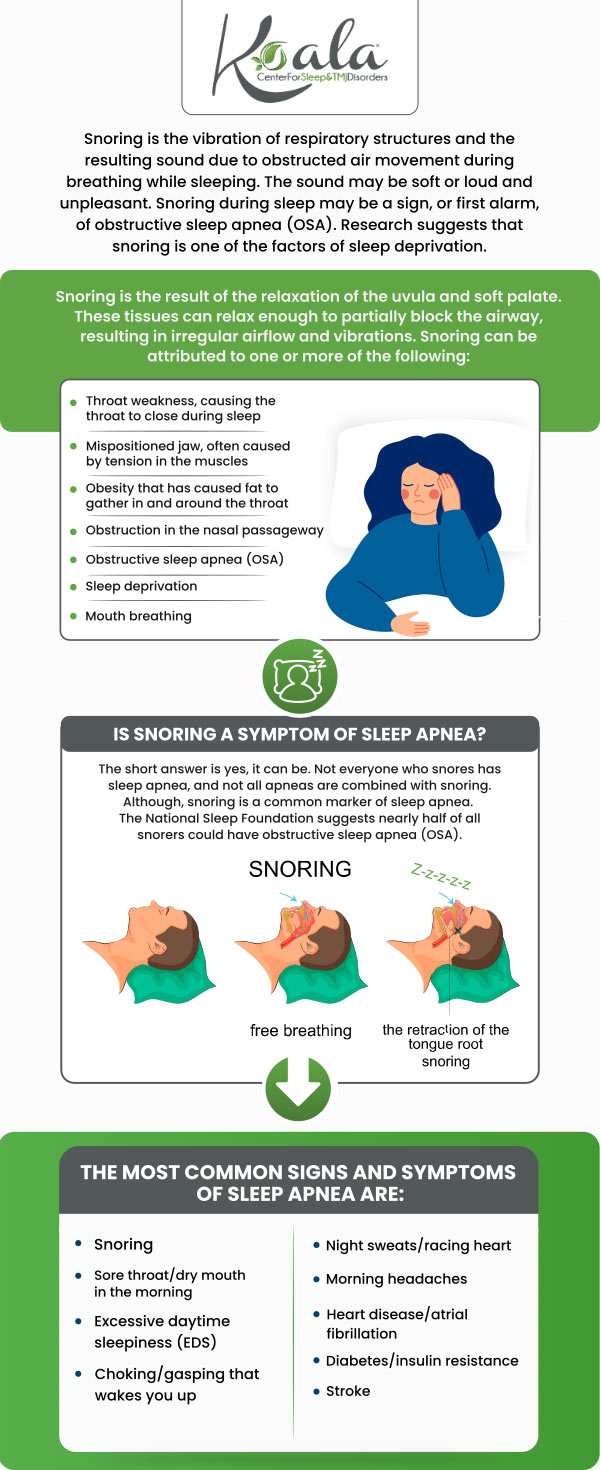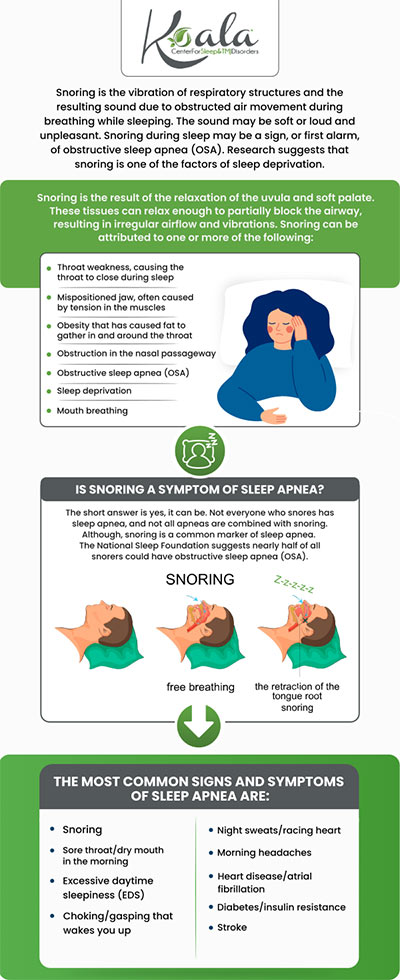How Can I Stop My Snoring?
Information on snoring and treatments is available to help you and your loved one! Call our team today at Koala® Center For Sleep & TMJ Disorders or visit us online to book an appointment. We have convenient locations across the U.S. in Bloomington IL, Peoria/Dunlap IL, Mishawaka IN, El Paso TX and Wausau WI


Table of Content:
How can I stop my snoring?
How do you sleep with a snorer?
Should you wake up a snoring person?
How do I know what kind of snorer I am?
There are many things you can do to help reduce your snoring. First, many doctors will recommend various lifestyle changes that may influence your snoring. For example, if you are overweight, it is more likely that snoring will occur, as the airways will become smaller and easier to obstruct.
Secondly, alcohol or drug use, as well as sedative use, should be decreased. This is because of the muscle-relaxing effect these substances have, which can cause structures of the mouth and throat to drop, or your airways to shrink. Smoking should also be reduced, as it can have many harmful effects on the lining of the airways and could increase snoring. You should strive for a regular and fulfilling sleep schedule and avoid sleeping on your back as that is when most of your snoring happens.
Raising the head of your bed or using multiple pillows to elevate your head can further reduce the likelihood of occurrence. Should lifestyle changes not work for you, many easy-to-buy applications can help. Many patients may try nose strips or external nostril dilators—these work to reduce snoring by opening the nostrils more to allow more effortless airflow. Oral appliances, like mouthguards or splints, may also help pull the jaw forward and keep the pharynx (the space at the back of your mouth and nose in which air passes through to reach the lungs) unobstructed.
Suppose there is suspicion of an underlying condition causing the snoring. In that case, your doctor may conduct medical imaging, such as an MRI, to determine if any anatomical deformities contribute to your condition. Your physician may also order a sleep study to be done, in which various functions of the body are monitored as you sleep to determine the cause. Commonly known best for sleep apnea treatment, CPAP and Bi-PAP machines may be used nightly.
A CPAP, or continuous positive airway pressure machine, utilizes positive pressure to keep your airways open while also delivering a constant oxygen flow. Similarly, a Bi-Pap, or bi-level positive airway pressure machine, uses the exact mechanism but has two pressure levels for exhalation (breathing out) and inhalation (breathing in). In the most extreme case, upper airway surgery may be conducted to stop your snoring.
This may include a somnoplasty in which tissues of the uvula and soft palate are removed, as they are often obstructive and can cause snoring. Alternatively, a maxillomandibular advancement (MMA) surgery may be performed. The upper and lower jaw are surgically displaced to be more forward, which opens the airways more.
Sleeping with a snorer can be very difficult, and the effects of long-term sleep deprivation can interrupt your life. First, it is best to try sleeping with earplugs or a distracting but calming noise, like white noise or nature sounds. You may purchase a set of headphones or earbuds that are purposefully ergonomic for sleep.
Anti-Snore pillows may also be tried, as well as rings or strips that keep the nostrils open. It is important to consider the health concerns that arise with severe snoring and to consult with physicians to determine if there is an underlying condition. If your partner suffers from allergies or frequent colds, it may be good to begin using a humidifier to moisten the air. A doctor may also prescribe CPAP or Bi-PAP machines if obstructive sleep apnea is the cause.
You may have heard not to wake a sleepwalker, but what about a snorer? It is generally said not to wake a sleepwalker as they can become confused and violent during the sudden transition from deep sleep to consciousness.
Though waking anyone may result in this, it is not necessarily a concern with snorers. So yes, you can safely wake up snorers, though this will likely disrupt their sleep cycle and will only provide minutes of relief. If you sleep with someone who has obstructive sleep apnea (OSA), it may be beneficial to wake them to relieve the obstruction and allow their breathing to continue.
Generally, there are four kinds of snorers, depending on where and why the snoring is happening. First, if your snoring is nose-based, it will likely sound like grunting or high-pitched whistling from the tiny passageways, the nostrils. A deviated septum, small nostrils, and blockages could cause nose-based snoring. Allergies and colds generating a stuffy nose could also be to blame. If you experience this, you may frequently wake up with a dry mouth, bad breath, or headaches.
Treatments that would help this kind of snoring may be nose strips or nostril dilating rings to keep the nose open, or surgery to reconstruct deformities in the nose. Secondly, your snoring may be mouth-based and could be happening if your nostrils are blocked or enlarged. This could occur if the soft palate, a portion of the mouth’s roof, relaxes and drops further down, resulting in a smaller airway and more difficult breathing. You will know if your snoring is mouth-based rather than nose-based if the snoring only occurs when your mouth is open.
Third, tongue snoring occurs when the muscular tongue relaxes and falls backward into the throat, effectively obstructing airflow. This may happen if you have a larger than usual tongue, use certain medications like sedatives and muscle relaxants, or regularly use intoxicating substances. Fourth, tongue snoring is usually high-pitched and inconsistent. If snoring happens only while sleeping on your back, you are likely a tongue base snorer. Finally, throat-based snoring is the loudest and most dangerous kind of snoring.
Seen in obstructive sleep apnea, the muscular throat relaxes and obstructs itself, blocking airflow to the lungs. If you snore in all positions and often wake up with headaches, drowsiness, and poor concentration, you may be a throat-based snorer.
At Koala® Center For Sleep & TMJ Disorders, we understand the burden snoring can have on your sleep quality and those around you. By booking an appointment with one of our dedicated sleep team members, all concerns can be addressed. In addition, an individualized treatment plan will be curated as soon as possible. So please, do not hesitate to reach out online or by phone; we are here for you.

Additional Services You May Need
▸ KoalaKIDZzz®
▸ Sleep Apnea
▸ Snoring
▸ TMJ Disorder
▸ Fatigue
▸ Sleep Disorders
▸ Weight Loss
▸ CPAP Alternative
▸ Oral Appliances




